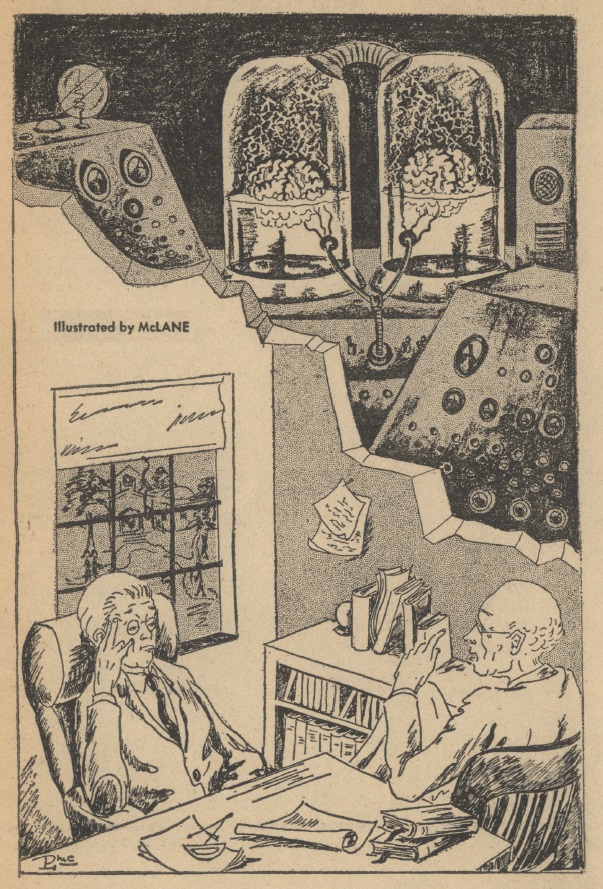
by Gideon Marcus
Last Days
After three lovely weeks, our trip to Japan is sadly drawing to a close. Someday, I can see relocating here for months out of the year — after all, my job really only requires a typewriter and access to a good postal service. That's for the future, though, when the Young Traveler has finished school and left the nest.
After Nagoya, we took a train to Hiroshima, the city made famous on August 6, 1945.

It has been nineteen years since the first atomic blast on Japan leveled a square mile of city and killed tens of thousands in an instant. Hiroshima, a port city on the west end of the island of Honshu, has largely recovered since then, but the scars of that day still bear mute witness to the attack.



It is a sobering thing to visit a place of such megadeath, not dissimilar to the eerie feelings I experienced walking down "Bloody Lane" at Antietam, where thousands died in a few hours just miles away from where my wife's mother now lives.
Yet, life goes on. Hiroshima is a vibrant city, peaceful and productive. They're building a new train station that will further stimulate the local economy. We like the people and the feeling here; this may well be come a standard stop for us in the future.
After several days in Hiroshima, we headed further south to our final stop, the island of Kyusuhu and the metropolis of Fukuoka.

Our main reason for stopping here was to visit our adoptive family, the Fujiis. Just after the war, the Fujii family sent their teenaged daughter, Miwako, to the States for a few weeks as part of a student exchange. The next year, my wife's little sister spent a year studying in Kyoto, where the Fujii's lived. They accepted her into their family, even including her in the annual family photo. Since then, Miwako, her sister Hideko, and their parents, Yuko and Yukio, have essentially become beloved in-laws, and we try to see them whenever possible.
Yukio, a former policeman, retired to his home town of Amagi, a little farm community a couple of hours from Fukuoka. He and Yuko reside in an ancient house there, a relic that dates back to before Commodore Perry sailed his black ships into Tokyo Harbor.

It's a beautiful, peaceful residence, and as luck would have it, Miwako, who had gotten married and moved to San Francisco, was also there for a visit. With her adorable handful, Jin.

We all took turns playing with the tyke until he, in the way of small children everywhere, wore himself out and fell asleep in his grandfather's arms.

The Issue at Hand
It is appropriate that the end of our trip coincides with the wrap-up of the science fiction magazines for this month. As always, the last magazine to be reviewed is this month's Analog. So how did this oversized slick of a mag do this time?
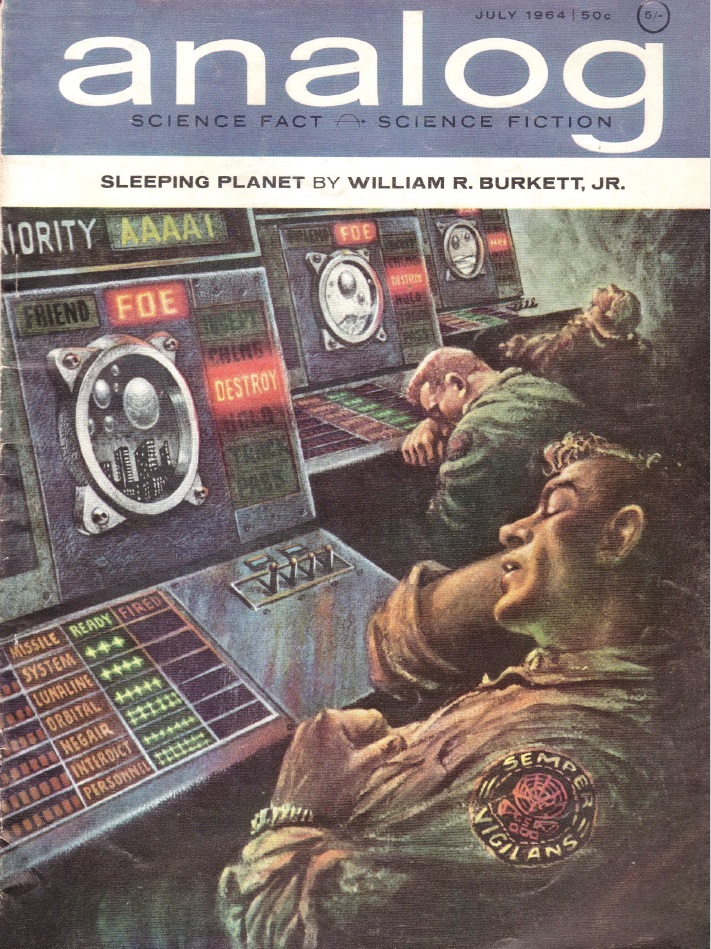
by Kelly Freas
Origin of the Solar System, by William F. Dawson and Ben Bova

Opening up the issue is an informative piece on a rather unusual suggestion for how the planets came to be. It lies somewhere between the Catastrophism of the stellar collision theory (which would make our solar system almost unique in the universe) and the Uniformitarianism of the "disk theory" which postulates that virtually all stars should be born with planets. The hypothesis advanced by Bova and Dawson is that solar systems result in binary systems in which the second star is not of sufficient size to ignite and thus breaks up into a bunch of smaller worlds.
I don't know if I buy it, but since the article does a good job of presenting both this concept and more traditional ones, it's a decent read.
Three stars.
Sleeping Planet (Part 1 of 3), by William R. Burkett, Jr.

by Kelly Freas
This new serial, written by a fellow I've never heard of, is a Mack Reynoldsy piece about an extraterrestrial attack on the Earth in the 26th Century. The aliens use some kind of sleeping powder that puts all of humanity, save for a few immune holdouts, into a state of suspended animation. Planet is the story of our resistance against the invaders.
I have to applaud Burkett for being willing to jump into the deep end on his first effort, turning in a novel-sized endeavor. He's a good writer, too, with the first half of the installment quite vivid and engaging. The aliens are just a bit too stupid, though (a big piece of the plot involves one of the survivors convincing the ETs that his dead grandfather will wreak vengeance on the invaders from beyond the grave…and they believe it!) and the light-hearted portions jar with the gritty ones.
Three stars so far, with a suspicion that this piece will end with a whimper, not a bang.
The Sea-Water Papers, by Raymond E. Banks

by John Schoenherr
An eccentric genius dies before he can explain how his desalination tablets work — is it the invention or the ingestion?
This is another too-cute piece starring clever garage-based scientists, the kind Analog editor, Campbell, loves. The kind that champion dowsing, perpetual motion machines, and reactionless drives.
Two stars.
A Day in the Life of Kelvin Throop, by R. A. J. Phillips
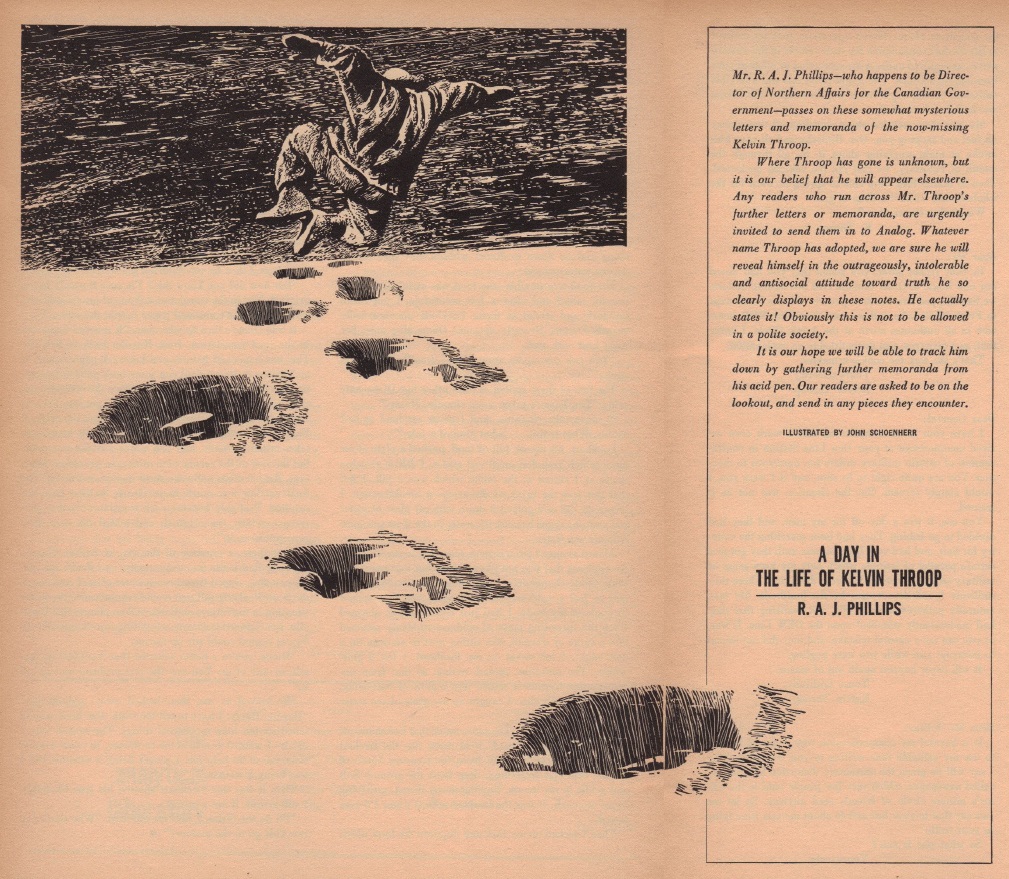
by John Schoenherr
In this one, Mr. Throop, late of the Canadian Northern Territories Public Relations Division, tells the citizens what he really thinks of their letters.
Not particularly entertaining nor remotely science fiction.
Two stars.
The Master Key, by Poul Anderson
Last up, we have the latest Let the Spacemen Beware. This one is really Van Rijn's story, in which he tells of a frozen world that seemed ideal for trade, but the not-quite-human (or perhaps too-human) aliens become inexplicably hostile upon learning of our fealty to a God, ending the affair in tragedy.
With this piece, Anderson, who had been slacking of late, returns to form. While the premise is a tad contrived, mainly so the reason for the aliens' change of heart can be explained neatly at the end, the telling is vintage Poul.
Four stars.
Doing the Math

On the whole, it's been a good month for SF. Analog finished at 2.9 stars, just on the disappointing side of good, but that's more an artifact of the scoring system. It's a decent issue, all things considered. Decidedly worse were F&SF and Worlds of Tomorrow, both clocking in at 2.3 stars.
All the other mags were better, from the disappointing by comparison but still 3.1 stars earning Gamma, to the decent Amazing and IF (3.2 stars) up to the well worth reading New Worlds and Fantastic (3.5 stars).
It's enough to make me eager to go back home and collect my accumulated subscriptions for August!

(Note: for those keeping track, women wrote 7 out of the 49 new fiction pieces published this month. Not great, but not as bad as it has been previously.)
[Come join us at Portal 55, Galactic Journey's real-time lounge! Talk about your favorite SFF, chat with the Traveler and co., relax, sit a spell…]

![[July 2, 1964] Completing the Tour (July 1964 <i>Analog</i>)](https://galacticjourney.org/wp-content/uploads/2019/06/640702cover-672x372.jpg)

![[June 30, 1964] A big Delta (June 1964 <i>Gamma</i>)](https://galacticjourney.org/wp-content/uploads/2019/06/640630cover-453x372.jpg)















![[June 28, 1964] Not Quite What You Think. ( <i>New Worlds, July-August 1964</i>)](https://galacticjourney.org/wp-content/uploads/2019/06/640628cover-563x372.jpg)


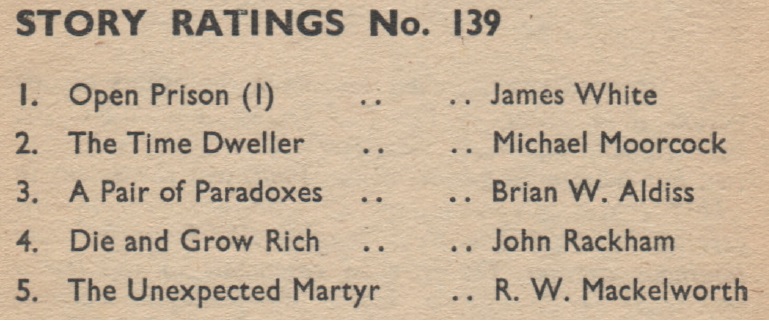

![[June 22, 1964] The Bridal Path (July 1964 <i>Fantastic</i>)](https://galacticjourney.org/wp-content/uploads/2019/06/640622cover-477x372.jpg)



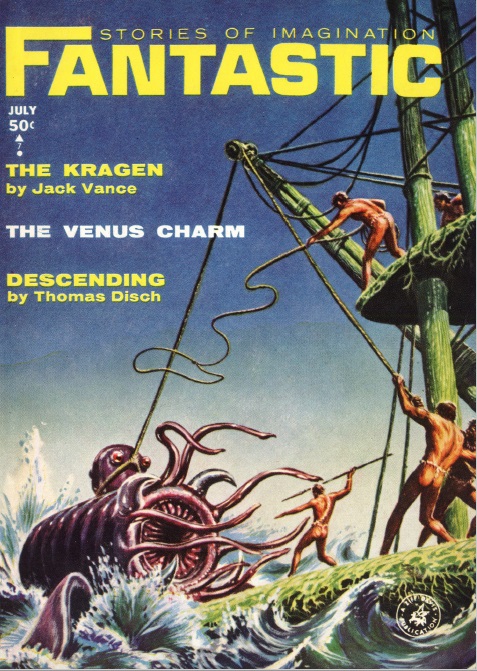

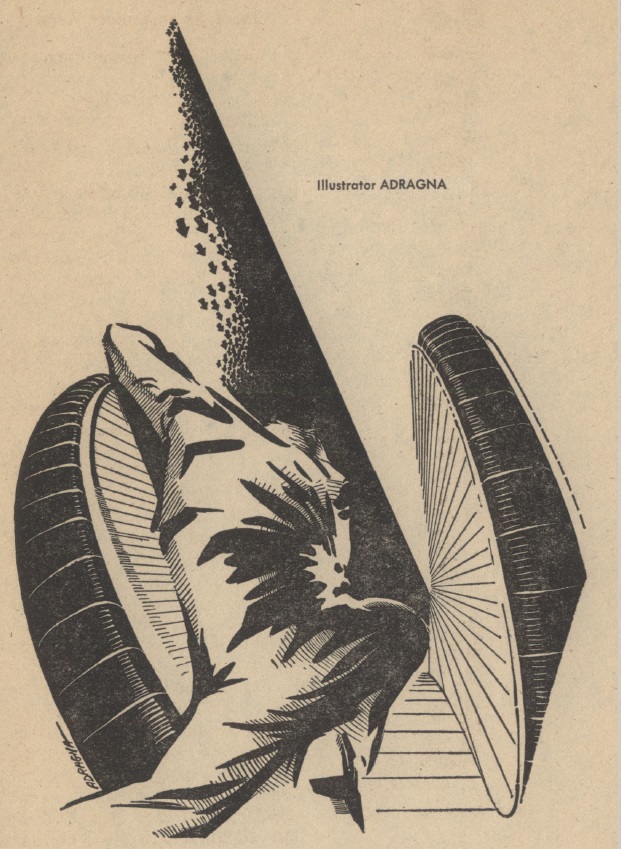



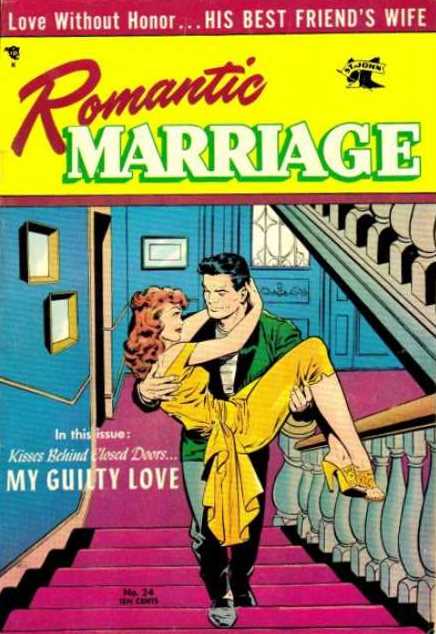
![[June 20, 1964] How low can you go? (July 1964 <i>Fantasy and Science Fiction</i>)](https://galacticjourney.org/wp-content/uploads/2019/06/640620cover-672x372.jpg)








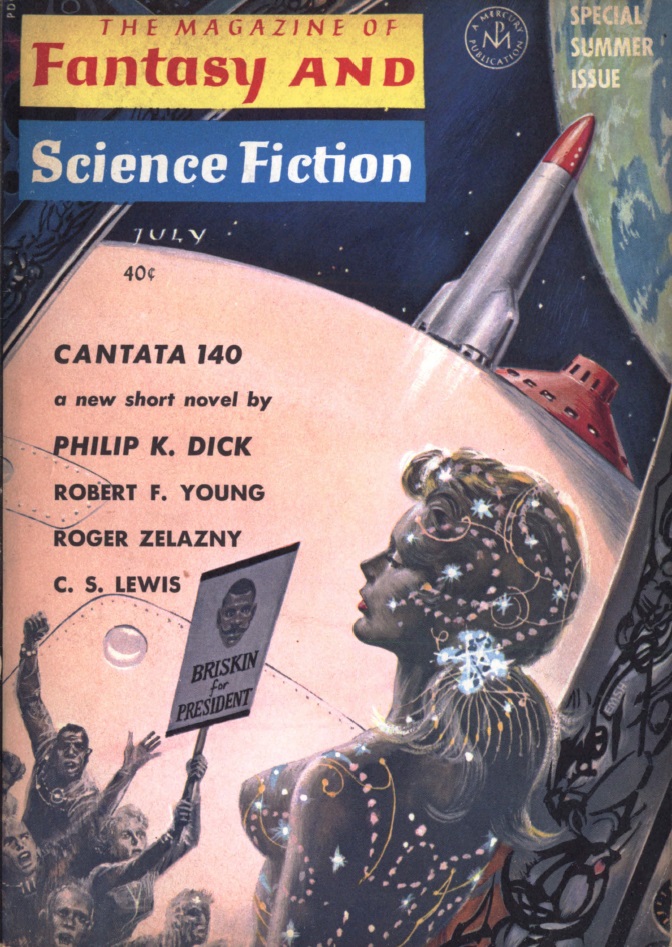

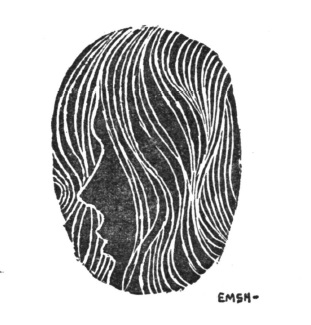



![[June 16, 1964] Strangers in Strange Lands (August 1964 <i>Worlds of Tomorrow</i>)](https://galacticjourney.org/wp-content/uploads/2019/06/6312017cover-672x372.jpg)







![[June 12, 1964] RISING THROUGH THE MURK (the July 1964 <i>Amazing</i>)](https://galacticjourney.org/wp-content/uploads/2019/06/640612cover-672x372.jpg)







![[June 8, 1964] Be Prepared! (July 1964 <i>IF</i>)](https://galacticjourney.org/wp-content/uploads/2019/06/640608cover-672x372.jpg)








![[June 2, 1964] June Gloom (June 1964 <i>Analog</i>)](https://galacticjourney.org/wp-content/uploads/2019/06/640602cover-672x372.jpg)

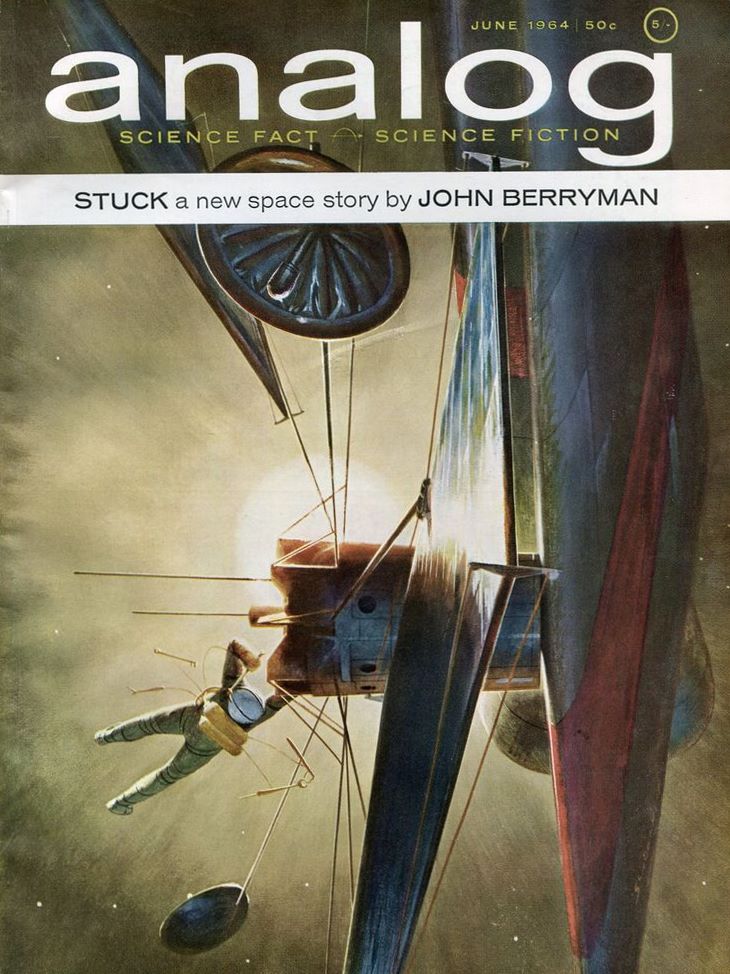

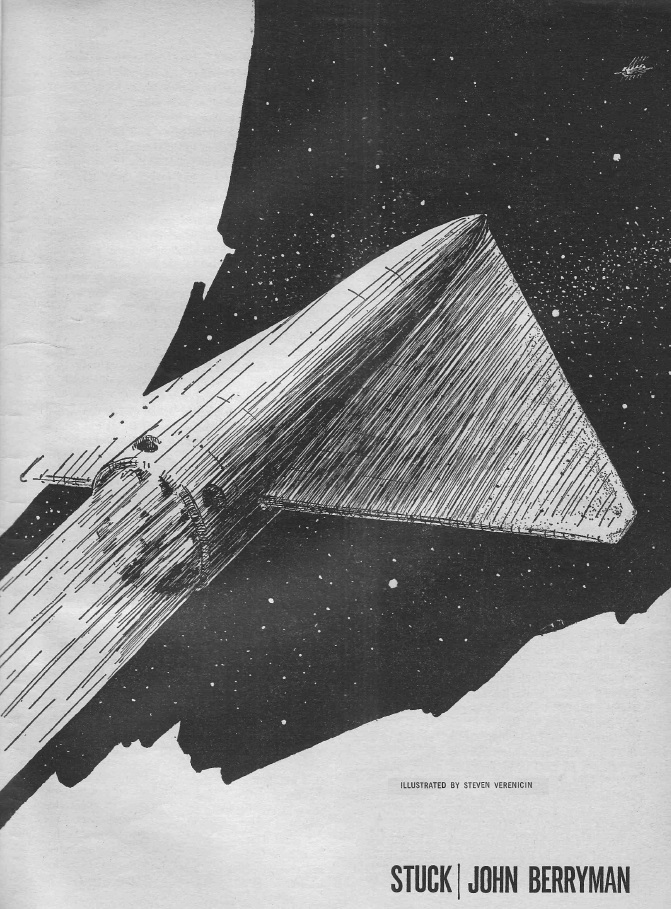
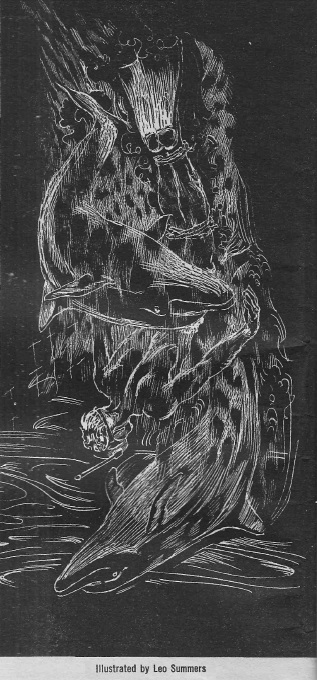
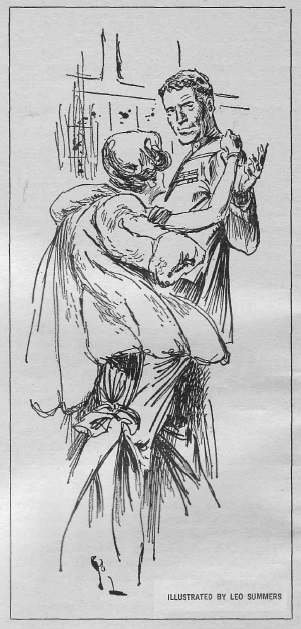
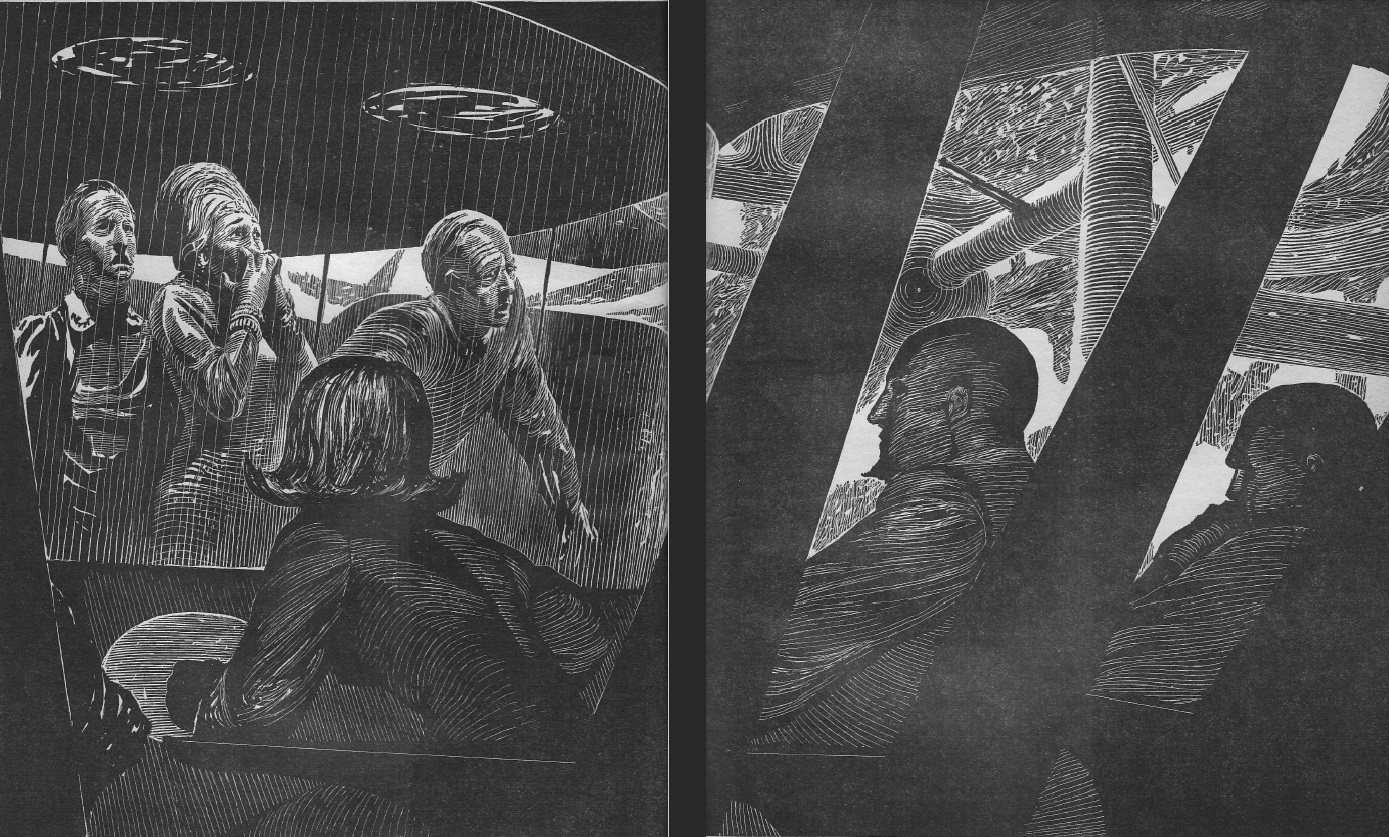
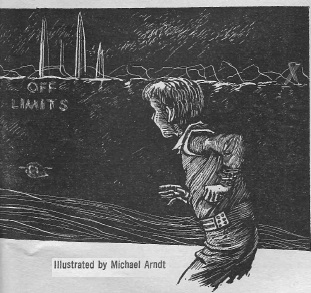
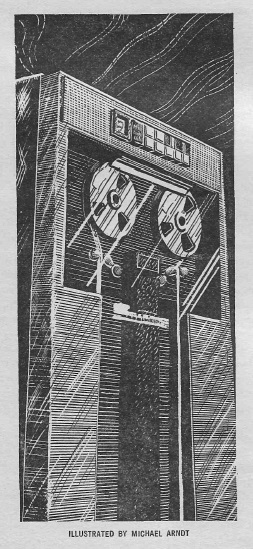

![[May 22, 1964] Not Fade Away (June 1964 <i>Fantastic</i>)](https://galacticjourney.org/wp-content/uploads/2019/05/640522cover-507x372.jpg)







